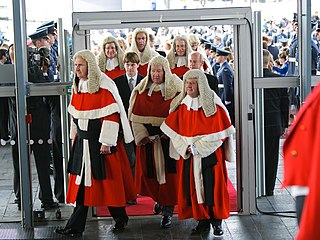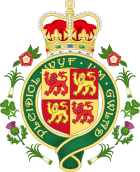
The Senedd, officially known as the Welsh Parliament in English and Senedd Cymru in Welsh, is the devolved, unicameral legislature of Wales. A democratically elected body, it makes laws for Wales, agrees to certain taxes, and scrutinises the Welsh Government. It is a bilingual institution, with both Welsh and English being the official languages of its business. From its creation in May 1999 until May 2020, the Senedd was officially known as the National Assembly for Wales and was often simply called the Welsh Assembly.

A legislative consent motion is a motion passed by either the Scottish Parliament, Senedd, or Northern Ireland Assembly, in which it consents that the Parliament of the United Kingdom may pass legislation on a devolved issue over which the devolved government has regular legislative authority.

The Welsh Government is the executive arm of the devolved government of Wales. The government consists of cabinet secretaries and ministers. It is led by the first minister, usually the leader of the largest party in the Senedd, who selects ministers with the approval of the Senedd. The government is responsible for tabling policy in devolved areas for consideration by the Senedd and implementing policy that has been approved by it.
The National Farmers' Union (NFU) is an employer association representing farming and growing businesses within England and Wales.

David Ian Jones is a British politician and former solicitor who briefly served as the Assembly Member for North Wales between 2002 and 2003 and then as Member of Parliament (MP) for Clwyd West from 2005 to 2024. He sat in the cabinet as Secretary of State for Wales from 2012 to 2014 making him the first Secretary of State for Wales to have served as an Assembly Member.

Politics in Wales forms a distinctive polity in the wider politics of the United Kingdom, with Wales as one of the four constituent countries of the United Kingdom (UK).

The Council for Wales, officially the Council for Wales and Monmouthshire, was an appointed advisory body announced in 1948 and established in 1949 by the UK government under Labour prime minister Clement Attlee, to advise the government on matters of Welsh interest. It was dissolved with the establishment of the post of Secretary of State for Wales and the formation of the Welsh Office in 1964/65.

Welsh law is an autonomous part of the English law system composed of legislation made by the Senedd. Wales is part of the legal jurisdiction of England and Wales, one of the three legal jurisdictions of the United Kingdom. However, due to devolution, the law in Wales is increasingly distinct from the law in England, since the Senedd, the devolved parliament of Wales, can legislate on non-reserved matters.

Welsh independence is the political movement advocating for Wales to become a sovereign state, independent from the United Kingdom.

The Counsel General for Wales is the Welsh Government's Law Officer, which means the government's chief legal adviser and representative in the courts. In addition to these "lawyer" roles the Counsel General also works to uphold the rule of law and integrity of the legal community in Wales, and has a number of important specific statutory functions, some of which are to be exercised independently of government and in the public interest.
A Welsh Government sponsored body (WGSB) is a non-departmental public body directly funded by the Welsh Government. Under the Government of Wales Act 1998 the bodies were sponsored by the National Assembly for Wales and were known as an Assembly sponsored public body, and this was changed by the Schedule 3 of the Wales Act 2017 which amended the Government of Wales Act 2006.

An Act of Senedd Cymru, or informally an Act of the Senedd, is primary legislation that can be made by the Senedd under part 4 of the Government of Wales Act 2006. Prior to 6 May 2020 any legislation was formally known as an Act of the National Assembly for Wales or informally, an Act of the Assembly.

In the United Kingdom, devolution is the Parliament of the United Kingdom's statutory granting of a greater level of self-government to the Scottish Parliament, the Senedd, the Northern Ireland Assembly and the London Assembly and to their associated executive bodies: the Scottish Government, the Welsh Government, the Northern Ireland Executive and in England, the Greater London Authority and combined authorities.

Jeremy Miles is a Welsh Labour Co-op politician serving as Cabinet Secretary for Health and Social Care since September 2024.
The Commission on Devolution in Wales, also known as the Silk Commission, was an independent commission established by Welsh Secretary Cheryl Gillan on 11 October 2011. The commission was based at the Wales Office Cardiff headquarters, at Cardiff Bay and met for the first time on 4 November 2011 at the Millennium Stadium, Cardiff. The commission reviewed the case for the devolution of fiscal powers to the Welsh Assembly, now the Senedd, and considered the case for increasing the powers of the assembly. It published its findings in two parts.

Theodore Huckle is a Welsh barrister. He served as the first and to date only independent professional Counsel General for Wales, the statutory Law Officer to the Welsh Government, during the governmental term of the 4th Assembly/Senedd. Upon nomination by the First Minister, his appointment was approved by the Senedd and formally made by the Queen on 21 July 2011, although he had been acting Counsel General from his birthday on 27 May 2011.
The Agricultural Wages Board (AWB) was a non-departmental government body which regulated minimum wages for farm workers in England and Wales. The AWB was abolished in the Conservative led government's "bonfire of the quangos" after the Enterprise and Regulatory Reform Act 2013 (ERRA).

Federalism in the United Kingdom aims at constitutional reform to achieve a federal UK or a British federation, where there is a division of legislative powers between two or more levels of government, so that sovereignty is decentralised between a federal government and autonomous governments in a federal system.

Welsh devolution is the transfer of legislative powers for self-governance to Wales by the Parliament of the United Kingdom. The current system of devolution began following the enactment of the Government of Wales Act 1998, with the responsibility of various devolved powers granted to the Welsh Government rather than being the responsibility of the Government of the United Kingdom.

The Cabinet Secretary for Rural Affairs is a member of the cabinet in the Welsh Government. The current officeholder is Huw Irranca-Davies since March 2024.
















